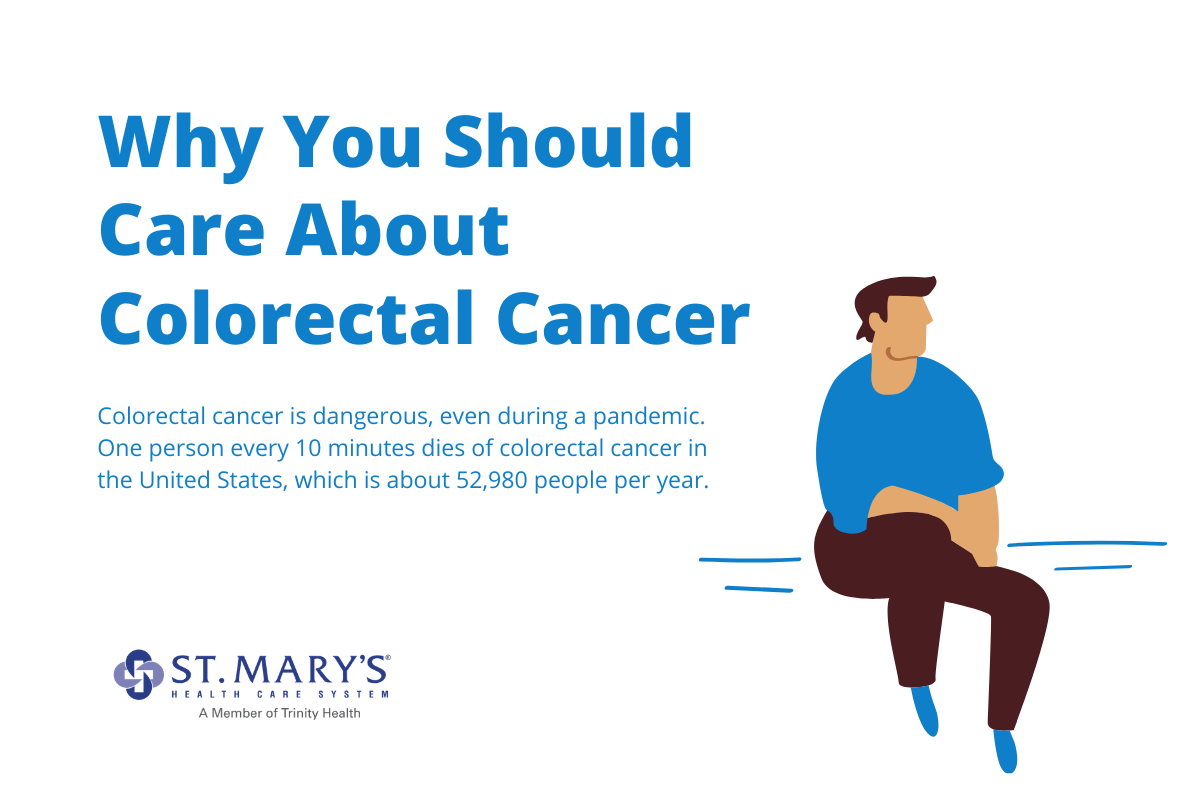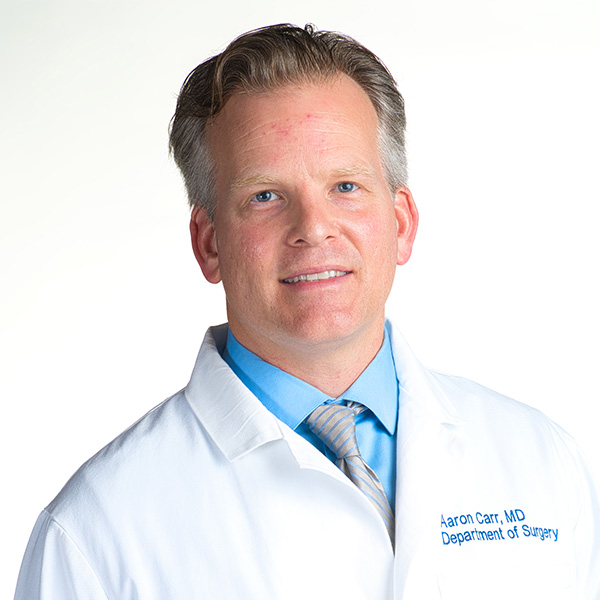Why You Should Care About Colorectal Cancer
March 1, 2021
By: Aaron Carr, M.D.
Categories: Healthy Living
Colorectal cancer is dangerous, even during a pandemic.
What is colorectal cancer?
It is cancer that occurs in the last 5-10 feet of the bowel, which is also known as the colon and rectum. The purpose of this portion of our bowel is to remove excess water from the food we eat and form our stool. The most common form of cancer in this area is called adenocarcinoma.
Why should I care about colorectal cancer?
One person every 10 minutes dies of colorectal cancer in the United States, which is about 52,980 people per year. About 140,000 people will be diagnosed this year with this type of cancer. It is the third most common cause of cancer death in women and second most common cause of cancer death of men in the United States. But death is not the only negative outcome of colorectal cancer. If not caught and treated early, patients who survive often experience significant impacts on their quality of life and their ability to do the things they love to do. Early detection and treatment can mitigate these impacts and improve outcomes for patients.
What are the signs of colorectal cancer?
Many people do not have specific symptoms until the cancer has become large and dangerous. The common symptoms are rectal bleeding, anemia, abdominal pain, and change in bowel habits. Colon cancer typically starts as a benign polyp that then progresses to cancer.
What conditions can increase my risk for colorectal cancer?
Age over 50, Personal history of colon polyps, family history of colon cancer, inflammatory bowel disease (ulcerative colitis or Crohn’s disease), childhood cancer, and abdominal radiation. If you are African American, then you have a higher risk of colon cancer and should talk to your doctor to consider screening earlier at age 45. Several factors you have the ability to modify also have been shown to increase colorectal cancer, especially obesity (BMI >30 kg/m2), diabetes, tobacco use, and alcohol use.
What are colon polyps?
Polyps are abnormal benign growths of tissue in the colon and rectum. "Benign" means they are, in and of themselves, harmless. However, certain types of polyps like adenomas increase an individual’s risk for cancer and can be removed during colonoscopy. Adenomas occur in 25-30% of people at age 50.
What can I do to help prevent colorectal cancer?
Key recommendations include:
- Engage in physical activity (like daily walking for at least 30 minutes).
- Eat a whole food, healthy diet high in vegetables, certain fruits, and fiber.
- Consider decreasing red and processed meat.
- Schedule a routine screening test for colorectal cancer starting at age 45-50 years old for average risk individuals, and younger for high risk individuals.
What tests should I have to detect colorectal cancer?
The best test for colorectal cancer is a screening colonoscopy, which everyone should have starting at age 45-50. This is where a small camera is inserted into your colon to inspect the inside lining while you are under moderate sedation. There are other tests, primarily stool tests for blood (FOBT and FIT tests) or cancer DNA (Cologuard ®), and even a CT scan. You should schedule an appointment with your primary care physician (PCP) to discuss the options. Gastroenterologists and General Surgeons are the physicians who typically perform colonoscopies. The recommendation is that healthy individuals with no history of cancer or polyps get a colonoscopy at least every 10 years after their initial test. If polyps are removed or other areas of concern are found, your doctor may recommend more frequent testing.
What is my next step?
If you have symptoms that might indicate colorectal cancer, talk to your PCP as soon as possible. He or she can assess your symptoms and then refer you to a gastroenterologist or general surgeon, as appropriate. If you don't have a PCP, you can use our "Find a Doctor" website feature or call us at (706) 389-3892 to find one.
If you do not have symptoms and are 45-50 years of age, talk to your PCP at your next wellness visit about when you should have your first screening exam. Again, if you need to find a PCP, visit our "Find a Doctor" feature or give us a call.
The general surgeons at Athens General and Colorectal Surgery, part of St. Mary's Medical Group, are highly skilled and experienced in performing colonoscopies and surgeries to treat colorectal cancer.

About Aaron Carr, M.D.
Dr. Carr specializes in general, foregut and bariatric surgery. At UC Davis in Sacramento, he has practiced within the Division of Foregut and Endometabolic Surgery and has been a Co-instructor of Record for Surgical Education in the School of Medicine.
He earned his bachelor’s degree in physics, Magna Cum Laude, from the University of Alabama in Birmingham, where he was also a NASA Space Center Grant Scholar. He went on to receive his medical degree from the University of South Alabama College of Medicine in Mobile, and to complete his residency in categorical general surgery at Atlanta Medical Center, where he served as chief resident in 2012.
He is certified by the American Board of Surgery and holds specialty certifications in fundamentals of laparoscopic and endoscopic surgery. He is a member of the Society of American Gastrointestinal and Endoscopic Surgeons, the American Society for Metabolic and Bariatric Surgery, and the American College of Surgeons.
Dr. Carr has been active in a wide variety of research projects on topics such as diabetes in bariatric surgery patients, single-incision and multi-incision robotic gallbladder removal surgery and alleviating chronic pain in thoracic surgery patients. His current research interests include comorbidities and outcomes in bariatric surgery and robotic and endoscopic surgical innovation.



